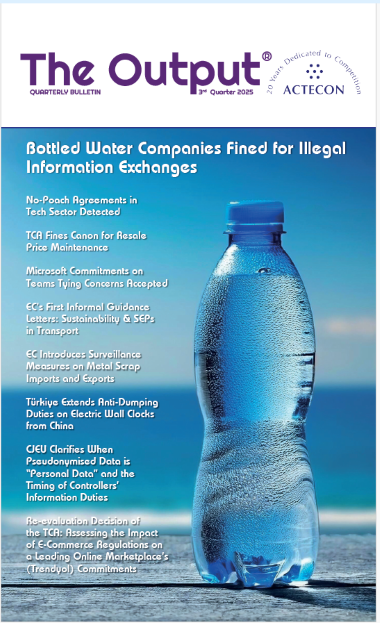TCA Identified Gun-jumping During Review of Subsequent Transaction (Broadcom/VMware decision)
| Competition Law

Article By Ayberk Kurt, Hanna Stakhyeyeva and Seda Eliri
Introduction
During its review of a separate notified transaction, the Turkish Competition Authority (“TCA”) uncovered a gun-jumping violation related to Broadcom’s acquisition of VMware. Specifically, in its decision dated 01.04.2024 and numbered 24-25/596-249, the Competition Board authorized KKR Management LLP to acquire all shares of VMware LLC’s End User Computing business line. However, in the course of this assessment, the TCA realized that Broadcom’s acquisition of VMware had not been notified in Türkiye, despite being reported to multiple competition authorities worldwide. This led the Board to initiate an ex officio investigation and subsequently impose a gun-jumping fine.
The Broadcom/VMware Decision (dated 18.07.2024 and numbered 24-30/707-296) offers critical insights into the Board’s evaluation of gun-jumping cases, addressing key issues such as turnover calculations, procedural obligations, and the availability of possible defences.
In this article we analyse the Broadcom/VMware decision, emphasising the Board’s strict stance in merger control enforcement and proactive approach to ensure compliance. The key message of this case is clear - gun-jumping violations may be identified during the review of later transactions. The businesses should pay a proper care at the stage of merger assessment to make sure there are no transactions that were overlooked or mistakenly not notified.
Broadcom/VMware Decision
In the decision, the Board examined the transaction regarding the acquisition of the sole control of VMware, Inc. (“VMware”) operating in the field of computer programming activities by Broadcom Inc. (“Broadcom”). Within the framework of the investigation initiated ex officio by the Board, both the competitive effects of the transaction and whether it constituted a gun-jumping violation was evaluated.
Within the scope of another acquisition review process subject to the Board’s decision, the TCA understood that the transaction for the acquisition of VMware by Broadcom was completed without notifying the TCA. However, the same transaction was notified to the authorities of the EU, USA, Australia, the United Kingdom, Brazil, Canada, China, the European Union, Israel, Japan, South Africa, South Korea and Taiwan. The European Commission authorised the transaction conditionally[1], while other authorities authorised it without any conditions.
Article 11 of the Competition Law stipulates that in cases where the merger or acquisition transactions, which are obligatory to be notified, have not been notified to the Board, the Board will automatically take the merger or acquisition into examination when it becomes aware of the transaction in any way. In accordance, when the Board realized that the acquisition of VMware by Broadcom was not notified in Türkiye, it decided to examine the Broadcom/VMware acquisition ex officio.
Notifiabillity – turnover for which year?
Firstly, it is necessary to determine whether the unnotified transaction is subject to notification or not. In accordance, the TCA analysed whether the turnover thresholds are exceeded within the scope of the file. In this case, the question arises as to which year’s turnover should be considered during the notifiability analysis. Pursuant to the seventh paragraph of Article 8 of the Communiqué No. 2010/4, the turnover determined “at the end of the fiscal year preceding the notification date or, if it is not possible to calculate it, at the end of the fiscal year closest to the notification date” is usually taken into consideration.
Considering that the notification was made on 21.05.2024, the turnovers of the parties to the transaction for the financial year 2023 should have been considered. However, the relevant provision is related to duly notified merger and acquisition transaction and in the Broadcom/VMware Decision, there is a notification made after the closing within the scope of the investigation initiated by the Board. In accordance, the Board concluded that the closing date of the change of control of VMware acquisition was 22.11.2023 and the turnover information that should be taken as basis in the assessment of whether the transaction was subject to the Board’s authorisation should be related to the fiscal year of 2022, which was the fiscal year preceding the closing date.
As a result of the analysis made based on the turnover for 2022, the Board determined that the turnover of the transaction parties exceeded the thresholds, and therefore, the VMware’s acquisition by Broadcom was subject to the Board’s authorisation.
Technology undertaking exception – applicable?
It should be noted that VMware could be considered as a technology undertaking since it is engaged in the development, production and delivery of virtualisation and related workload management technologies for information technology software, data centres and cloud environments, as well as software development and end-user management, i.e. the field of software. Therefore, although the Board did not directly mention it in its analysis, the transaction would have been notifiable even if the threshold of TRY 250 million was not met.
Impact of the transaction
The Board then analysed the effects of the transaction on the potential relevant product markets and decided that there was no horizontal or vertical overlap between the activities of the acquirer Broadcom and the target VMware in Türkiye, and even if there was a potential horizontal overlap due to the fact that they operate with a wide range of products, the transaction would not lead to any concentration that would give rise to anti-competitive concerns, considering the low market shares of the transaction parties in the relevant markets in Türkiye, the highly fragmented structure of the markets, the large number of players operating in the markets and the presence of players with high market shares. Therefore, the Board eventually authorised the transaction.
Gun-jumping assessment
In relation to gun-jumping analysis, the Board concluded that Broadcom’s acquisition of VMware was not duly notified, as the notification to the TCA was submitted on 21.05.2024, despite the change of control occurring on 27.11.2023. In its defence, Broadcom provided the following justifications for the failure to notify:
- At the time of assessing the notification obligations prior to signing the transaction agreement, Broadcom considered the connection of the transaction with Türkiye weak and indirect,
- Although the Agreement was signed on 26.05.2022, Broadcom did not reassess its notification obligations following the revisions in the Turkish merger control thresholds in the period leading up to the transaction’s closing on 27.11.2023.
The Board noted that, based on Broadcom’s statements, the company believed that there would be no effect on the Turkish market as a result of the transaction, but the issue of whether there would be any anti-competitive effect in the markets subject to the investigation as a result of the transaction was related to the merits that falls within the authority of the Board to make such assessment within the scope of the Competition Law. In addition, it was underlined that the notification obligation is a procedural requirement which must be fulfilled regardless of the impact of the transaction on the market. The TCA did not take into account the Broadcom’s defence that the transaction had limited connection to the Turkish markets.
Regarding the second ground of Broadcom, the threshold revision put forward by Broadcom was the one that also introduces the technology undertaking exception. The Communiqué involving these changes published in the Official Gazette dated 4 March 2022 and entered into force on 4 May 2022. So, as rightly emphasized by the Board, the Agreement was signed after the entry into force of the revised notification thresholds. Therefore, the Board decided that the second ground was also unacceptable.
In this framework, since the last sentence of the first paragraph of Article 16 of the Competition Law stipulates that the administrative fine to be imposed in the event that the mergers and acquisitions subject to authorisation are carried out without the Board’s authorisation shall be imposed on “each of the parties in merger transactions, and only the acquirer in acquisition transactions”, it was decided that Broadcom, as the acquirer, should be imposed an administrative fine of 0.1% of its gross revenue from Türkiye for the year 2023 due to the completion of the transaction without the authorisation.
Background information on Thresholds
Under Turkish merger control regime, the transaction that will result in a permanent change in control, would be notifiable to the Board in case one of the below turnover thresholds are triggered:
- The transactions where the aggregate Turkish turnover of the transaction parties exceeds TRY 750 million (approx. EUR 21.1 million or USD 22.8 million or GBP 17.9 million for 2024 financial year) and the Turkish turnovers of at least two of the transaction parties separately exceeds TRY 250 million (approx. EUR 7 million or USD 7.6 million or GBP 5.9 million for 2024 financial year).
OR
- In acquisitions: assets or operations that are subject to the acquisition, and in mergers: the Turkish turnover of at least one of the transaction parties exceeds TRY 250 million and global turnover of at least one of the other transaction parties exceeds TRY 3 billion (approx. EUR 84.5 million or USD 91.4 million or GBP 71.6 million for 2024 financial year).
In addition to the above, with the “technology undertaking” exception, which was introduced in May 2022, the TRY 250 million thresholds that are mentioned under the two tests of the thresholds are not applicable in the acquisitions of technology undertakings that (i) are active or (ii) have R&D activities, in the Turkish geographic market or (iii) that provide services to customers in Türkiye. Technology undertakings are defined as undertakings active in areas of digital platforms, software and gaming software, financial technologies, biotechnology, pharmacology, agrochemicals and health technologies.
Pursuant to Turkish merger control regime, mergers and acquisitions exceeding the applicable thresholds must be notified to the TCA before their implementation. According to Article 16 of Competition Law, if such concentrations requiring authorization are realized without prior notification and approval of the Competition Board, an administrative fine of 0.1% of the annual gross Turkish revenues of undertakings shall be imposed on natural and legal persons having the nature of an undertaking and on associations of undertakings or members of such associations. The implementation of transactions without obtaining the Board’s authorization is called “gun-jumping” and is subject to an administrative fine.
Conclusion
The Broadcom/VMware decision underscores the importance of conducting a procedural notifiability analysis based on the TCA’s thresholds for all global transactions—regardless of their marginal nexus with Türkiye. While Broadcom emphasised that the transaction had little relevance to Türkiye, the Board reaffirmed that assessing competitive effects is solely within its authority and that notification is mandatory whenever transaction exceeds the turnover thresholds.
The introduction of the technology undertakings exemption on 4 May 2022, combined with the lack of an update to the turnover thresholds despite the depreciation of the Turkish lira, has made it easier for transactions to surpass the notifiability thresholds. If a notifiability analysis is incorrect and the obligation to notify is not fulfilled, a fine becomes inevitable, as the TCA maintains a strict stance on gun-jumping and does not accept any defence for failure to notify a notifiable transaction.
Another interesting observation is that although the Board did not directly mention in the Broadcom/VMware decision that VMware qualifies as a technology undertaking and therefore falls within the scope of the exception, two key factors suggest otherwise. First, VMware’s field of activity clearly aligns with the definition of a technology undertaking. Second, the Broadcom’s reference to the Communiqué introducing the technology undertaking concept in its defence against the gun-jumping allegations indicate that the parties may have misinterpreted the technology undertaking exception in the notifiability analysis, ultimately leading to a gun-jumping violation.
Moreover, the Broadcom/VMware decision once again demonstrates that the TCA may identify a gun-jumping infringement during the notification of a subsequent transaction. In such cases, the TCA quickly opens an ex officio investigation, as in the Broadcom/VMware decision. Therefore, transactions that were overlooked or mistakenly not notified constitute a risk factor for future transactions.






